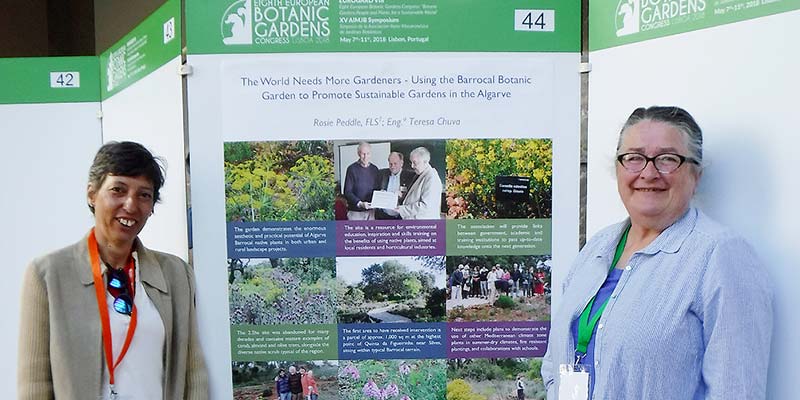Although much conservation work is the responsibility of government agencies and global organisations, local associations also have a huge part to play. Global protocols make special mention of the role of gardeners in plant conservation and species’ recovery.
The Barrocal is one of three ecological areas of the Algarve (Serra, Barrocal and Litoral). It has natural conditions of high scientific interest and biodiversity. It is important to share, with anyone involved with garden and land management, knowledge about the flora of this special territory. The Barrocal has a well-documented flora of 1001 taxa, 461 genera and 101 botanical families. The area runs along the length of the Algarve between the Serra and the coastal strip and comprises an extensive range of variable calcareous soils.
The strong desire to see plant life continue and thrive needs the support of individuals.
The Mediterranean Gardening Association promotes links between knowledgeable gardeners, academics and professionals in horticulture. Since its start in 2016, the Barrocal Botanic Garden project has attracted interest across the botanical and horticultural community. There is also an economic case to be made based on the benefits of botanic and demonstration gardens in this region as it already attracts a high number of tourists and is seeking to expand the ‘out-of-season’ visitor opportunities.
Our chosen site has been abandoned land for many decades, allowing native plants to recover and with the typical vestige woody plants of carob, almond and olive trees present. The land currently involved in this project (approximately 1,000sqm) is part of a larger area in secure private ownership with existing demonstration gardens.
The prospect of in-situ conservation of a rich natural plant community is a remarkable opportunity in a region under enormous pressure from tourist and other developments. The challenges of restoration ecology, pressure on water supplies and habitat loss are all present in the Mediterranean climate zones, and the Algarve is no exception.
The promotion of sustainable gardening knowledge and skills using native plants is an urgent and necessary task.
Teresa Chuva and I were invited to participate in the European Botanic Garden Congress, held for the first time in Portugal (Lisbon) between May 7 and 11.
The Algarve Barrocal Botanic garden was the subject of a poster and presentation to the congress.
In our poster, we had photos of the lovely Anacamptis pyramidalis, which carpets part of the Algarve Botanic Garden, and currently there is Thapsia villosa and Lavandula luisieri in flower with contrasting lime green and deep violet colours on show.
Over 30 countries were represented at the congress and 300 people took part during a full week of debates and presentations. Subjects ranged from botanic gardens and science, global change and education through to sustainability, heritage and tourism.
Examples of projects currently undertaken by botanic gardens included running seed banks, global tree searches, weekly podcasts and school partnerships as well as the maintenance of important plant collections and historic buildings.
It was not all work and no play … as part of the celebrations to mark the 250th anniversary of Ajuda Botanic Garden, everyone was invited to the garden for dinner with the ‘Marquês de Pombal and his family’ – but they were the only ones dressed properly for the occasion!
A recurring theme at the congress was the need for training and education in horticultural techniques to produce rare and endangered plants. Everyone agreed that it was imperative not only to collect and save seed but also to retain and nurture gardeners who could grow them into viable plants.
The world really does need more gardeners and here in the Algarve we are doing our bit to encourage everyone to get their hands dirty.
By Rosie Peddle
|| features@algarveresident.com
rosie@thebtf.net | 289 791 869
Mediterranean Gardening Association – Portugal




















